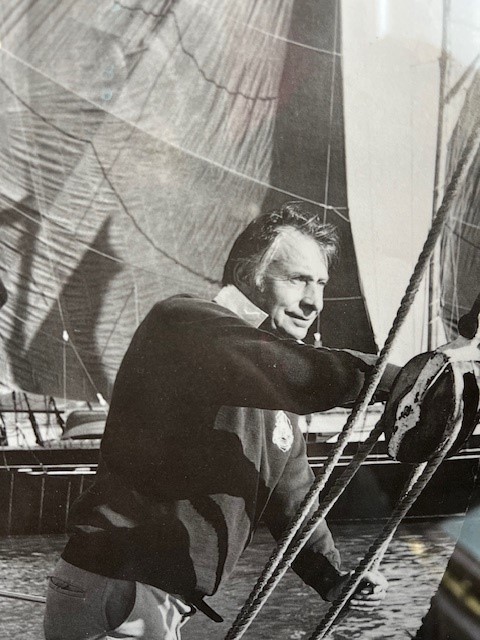We are very sad to hear that Jimmy Lawrence, known to many in the East Coast sailing community and much further afield, has crossed the bar.
It is with great sadness that we have to announce the death of Jimmy Lawrence, who died peacefully in hospital last night. Jimmy was a local legend and long time member of the Colne Yacht Club, who led an active life into his 90’s. A Bargee by trade, Jimmy was a highly qualified commercial skipper who traded under sail and won many cups on the racing circuit. He had spent the first 15 years of his working life on Thames Barges, becoming the youngest skipper in the fleet at the age of 18 and going on to be one of the last skippers when trading ceased on traditional barges in 1963.
Jimmy then started his renowned sail making business in Brightlingsea using traditional methods to make sails, retiring in 1995. He continued to race, sail, play the accordion, sing and write his memoirs to the end.
In line with Colne Yacht Club tradition the club flag is being flown at half mast, as are a number of flags in the Smack Dock. Our thoughts and prayers are with Jimmy’s family and friends at this sad time. We will keep members informed of funeral arrangements in due course.
Colne Yacht Club, 22 January 2024


Jimmy left his Colchester school to join ‘Gladys‘, a ‘free agent’ barge that went ‘anywhere’, as her third hand on £1 a week in 1948. Learning his trade as a sailorman, as barge crew were widely known, he swiftly rose to mate, joining ‘Falconette’, of the 40-strong Colchester Barge Fleet, trading between London and the East Anglian ports. There were 150 sailing barges left then, he says. Barge hands and skippers worked on a share scheme: “Half went to the owner and the rest was divided between the crew,” he explains. “You weren’t paid to sail empty, and we often went empty up to London. But let’s say you grossed £60 for a trip. £30 went to the owner, £20 went to the skipper and £10 to the mate. The mate and skipper paid the third hand his weekly wage between them – that’s because a third man was often considered unnecessary. The owner paid for the upkeep of the barge and repairs and the crew would pay living expenses – food and bedding, coal for the stove and so on.”
Extract from an interview with Dan Houston, 1999
Full article in Classic Sailor

You must be logged in to post a comment.